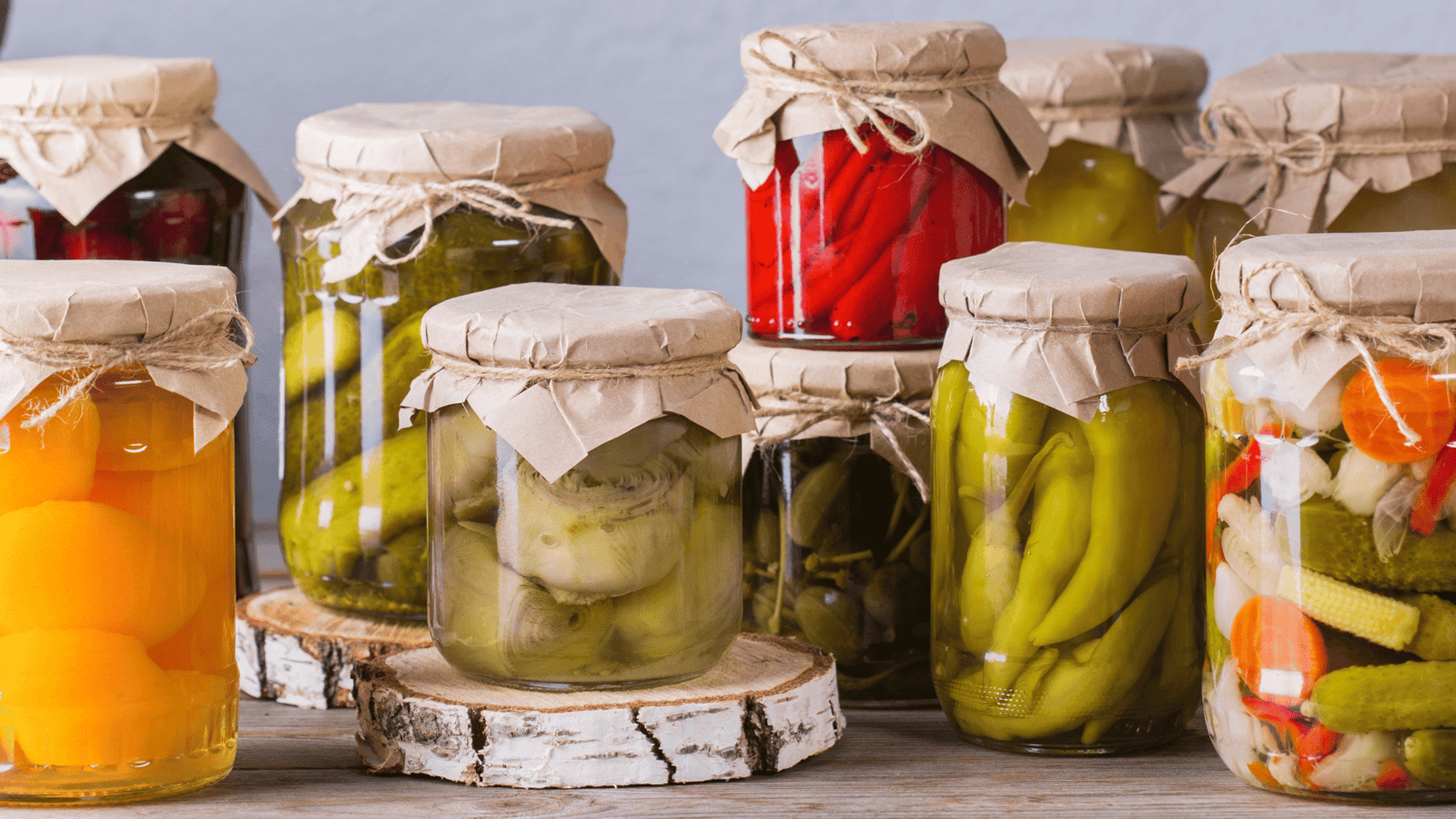Fermented food has gained significant popularity in recent years and for good reason because the benefits of fermented food are significant. Not only do these unique culinary creations add a delightful tang to our taste buds, but they also offer a plethora of health benefits. From improving digestion to boosting the immune system and enhancing mental well-being, fermented foods have become a staple in many diets worldwide.
In this article, we will explore the fascinating world of fermented food, uncover its historical background, delve into its numerous health benefits, discuss different types of fermented foods, and provide practical tips on incorporating them into your diet.
I. Introduction
Fermented food refers to a group of food products that have undergone a natural transformation process known as fermentation. This process involves the action of bacteria, yeasts, or other microorganisms that convert carbohydrates, such as sugars and starches, into alcohol or organic acids. The resulting food has a unique flavor, texture, and increased nutritional value compared to its original form.
II. Historical Background of Fermented Food
Fermented food has a rich historical background that dates back thousands of years. Our ancestors discovered the art of fermentation as a means of food preservation and later realized its transformative effects on taste and health. Various cultures around the world have their own traditional fermented foods, each reflecting the unique flavors and practices of their respective regions.
III. Health Benefits of Fermented Food
A. Enhanced Digestion and Gut Health
- Introduction to gut microbiota: Our digestive system is home to trillions of microorganisms, collectively known as the gut microbiota. These tiny organisms play a crucial role in maintaining our overall health, influencing digestion, immune function, and even mental well-being.
- Role of fermented food in promoting healthy gut flora: Fermented foods, rich in probiotics, introduce beneficial bacteria into our gut, promoting a diverse and balanced microbiota. This can help improve digestion, reduce bloating, and alleviate gastrointestinal issues.
- Improved digestion and nutrient absorption: The enzymes produced during fermentation aid in breaking down complex molecules, making them easier to digest and absorb. This enhanced nutrient availability benefits our overall health and well-being.
B. Boosted Immune System
- Introduction to the immune system: Our immune system is responsible for defending our body against harmful pathogens. A strong immune system is essential for overall health and disease prevention.
- Fermented food and immune function: Consuming fermented foods regularly can help modulate the immune response, leading to improved immune function. The beneficial bacteria present in these foods stimulate the production of immune cells and support the body’s natural defense mechanisms.
- The Role of Probiotics in immune support: Probiotics, found abundantly in fermented foods, have been shown to enhance immune function by promoting the production of antibodies and reducing inflammation.
C. Increased Nutrient Availability
- Bioavailability of nutrients in fermented food: Fermentation breaks down complex molecules, making nutrients more bioavailable. This means that our bodies can absorb and utilize the vitamins, minerals, and antioxidants present in fermented foods more effectively.
- Enhanced absorption of vitamins and minerals: Fermented foods such as sauerkraut and kimchi are excellent sources of vitamins C and K, while dairy-based fermented foods like yogurt and kefir are rich in calcium and B vitamins. Consuming these foods can help address nutritional deficiencies and support overall health.
- Specific examples of nutrient-rich fermented foods: Fermented soy products like tempeh are high in protein, while kombucha, a fermented tea, provides beneficial antioxidants. These examples illustrate the wide range of nutrients available in fermented foods.
D. Potential Weight Management
- Fermented food and satiety: Fermented foods are often rich in fiber, which can promote feelings of fullness and satiety. This can be beneficial for weight management by reducing excessive food intake.
- Influence on metabolism and weight regulation: Some studies suggest that the consumption of fermented foods may positively affect metabolism, potentially leading to weight loss or maintenance. More research is needed to fully understand the mechanisms involved.
- Examples of fermented foods that aid in weight management: Foods like yogurt and kimchi have been associated with lower body weight and reduced abdominal fat. Incorporating these fermented foods into a balanced diet can contribute to healthy weight management.
E. Improved Mental Health
- The gut-brain connection: Emerging research highlights the intricate connection between our gut and brain, known as the gut-brain axis. The health of our gut microbiota has been linked to various aspects of mental health, including mood and stress regulation.
- Fermented food and mental well-being: Consuming fermented foods can positively influence gut microbiota, leading to potential benefits for mental well-being. Some studies suggest that fermented foods may reduce symptoms of anxiety and depression, although more research is needed.
- Reduction of anxiety and depression symptoms: Certain strains of probiotics found in fermented foods have been shown to have a positive impact on anxiety and depression symptoms. While not a substitute for professional mental health care, incorporating fermented foods into a holistic approach to mental well-being may be beneficial.
⭐ At SmoothiePerks, we’ve written a blog post about Fermented Pickles – which you might be interested in reading.
IV. Types of Fermented Foods
Fermented foods come in a wide variety of types and flavors, catering to different culinary preferences. Let’s explore some of the most popular categories:
A. Dairy-Based Fermented Foods
- Yogurt: Yogurt is made by fermenting milk with specific bacterial strains. It is known for its creamy texture, tangy flavor, and probiotic content. Yogurt can be enjoyed plain or used in various recipes, such as smoothies or parfaits.
- Cheese: Cheese is produced through the fermentation of milk by adding specific cultures. It offers a wide range of flavors, textures, and varieties, making it a versatile and beloved fermented food worldwide.
- Kefir: Kefir is a fermented milk drink known for its probiotic content and tangy taste. It is made by fermenting milk with kefir grains, which contain a combination of yeasts and bacteria. Kefir can be consumed on its own or used as a base for smoothies and dressings.
B. Vegetable-Based Fermented Foods
- Sauerkraut: Sauerkraut is a traditional fermented cabbage dish that originated in Eastern Europe. It is made by fermenting shredded cabbage with salt, resulting in a tangy and crunchy condiment that pairs well with various dishes.
- Kimchi: Kimchi is a staple in Korean cuisine, made by fermenting vegetables like Napa cabbage, radishes, and scallions with chili peppers and other seasonings. It offers a unique combination of flavors, from spicy to tangy and umami.
- Pickles: Pickles are cucumbers or other vegetables that have been submerged in a brine solution and left to ferment. Fermented pickles are known for their crisp texture and sour taste, making them a popular snack or accompaniment to meals.
C. Grain-Based Fermented Foods
- Sourdough bread: Sourdough bread is made by fermenting a mixture of flour and water with wild yeast and lactic acid bacteria. This traditional fermentation process gives the bread its characteristic tangy flavor, chewy texture, and improved digestibility.
- Fermented rice: Fermented rice is a staple in many Asian cuisines. The fermentation process breaks down complex carbohydrates, making rice easier to digest. Fermented rice is used in dishes like sushi and rice vinegar.
- Tempeh: Tempeh is a traditional Indonesian food made from fermented soybeans. It has a nutty flavor, and firm texture, and is a popular meat substitute for vegetarian and vegan diets.
V. Incorporating Fermented Foods into Your Diet
A. Tips for Choosing Fermented Foods
- Reading labels: When selecting fermented foods, it is essential to read the labels and choose products that contain live cultures or active probiotics. Avoid options that have undergone pasteurization, as this process can kill beneficial bacteria.
- Opting for homemade options: Making fermented foods at home allows you to have more control over the ingredients and fermentation process. There are numerous resources and recipes available online to help you get started with homemade fermentation.
- Exploring local markets and specialty stores: Local farmers’ markets and specialty stores often offer a wide selection of artisanal fermented foods. Exploring these options can expose you to unique flavors and support local producers.
B. Simple and Delicious Fermented Food Recipes
- Yogurt Parfait with Fresh Fruits: Start your day with a refreshing yogurt parfait. Layer your favorite yogurt with fresh fruits, granola, and a drizzle of honey for a nutritious and delicious breakfast.
- Fermented Vegetable Salad: Combine fermented vegetables like sauerkraut, kimchi, and pickles with fresh greens, herbs, and a tangy vinaigrette for a flavorful and probiotic-rich salad.
- Sourdough Toast with Avocado and Probiotic Spread: Toast a slice of homemade sourdough bread, spread it with mashed avocado, and top it with a probiotic-rich spread like homemade fermented hummus or cream cheese for a satisfying and gut-friendly snack.
VI. Conclusion
In conclusion, fermented food offers an array of benefits that go beyond its tantalizing taste. From supporting digestion and gut health to boosting the immune system and potentially aiding weight management, incorporating fermented foods into your diet can contribute to overall well-being. With a wide variety of options, such as dairy-based, vegetable-based, and grain-based fermented foods, you can easily find something to suit your palate. So why not embark on a culinary adventure and savor the flavors and benefits of fermented food?
FAQs (Frequently Asked Questions)
Q1: Can I consume fermented food if I’m lactose intolerant?
A: Yes, many fermented foods, such as yogurt and kefir, are well-tolerated by individuals with lactose intolerance. The fermentation process breaks down lactose, making it easier to digest. However, it’s always best to start with small amounts and listen to your body’s response.
Q2: Are fermented foods safe to consume during pregnancy?
A: Generally, fermented foods are safe to consume during pregnancy. However, it’s essential to choose high-quality, pasteurization-free options to minimize the risk of harmful bacteria. If you have any concerns, it’s advisable to consult with your healthcare provider.
Q3: Can fermented food cure digestive disorders?
A: While fermented foods can support digestive health, they are not a cure for digestive disorders. If you have a specific digestive condition, it’s crucial to seek professional medical advice for appropriate diagnosis and treatment.
Q4: How long do fermented foods last in the refrigerator?
A: The shelf life of fermented foods can vary depending on factors such as the specific food, fermentation process, and storage conditions. In general, most fermented foods can last for several weeks to months when stored properly in a sealed container in the refrigerator.
Q5: Can I ferment foods at home without specialized equipment?
A: Yes, you can ferment foods at home without specialized equipment. Basic kitchen tools like glass jars, fermentation weights or improvised weights, and clean kitchen towels can be used to create a conducive fermentation environment. There are also various fermentation kits available that can simplify the process.
ⓘ Disclaimer:
Please note that the information provided in this blog post is for general informational purposes only and does not constitute professional advice. The author of this article is not an expert. It is important to consult with a qualified professional. The content of this blog post is based on the author’s personal experiences, research, and opinions. SmoothiePerks.com nor the author assumes no responsibility or liability for any consequences resulting from the use of this information. By reading this blog post, you acknowledge and accept that the information provided here is not a substitute for professional advice.
ⓘ Disclosure
Amazon Associates Program: smoothieperks.com is a participant in the Amazon Services LLC Associates Program, an affiliate advertising program designed to provide a means for sites to earn fees by advertising and linking to Amazon.com.
ⓘ Affiliate Disclaimer/Disclosure:
Please assume any links to 3rd party products are affiliate links for which I may receive a small payment from the vendor if you decide to sign up or purchase – at no cost to you.





4 thoughts on “Benefits of Fermented Food”